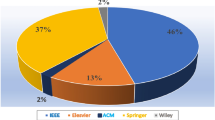Abstract
As an extension of cloud computing, the edge computing has become an important pattern to deal with novel service scenarios of Internet of Everything (IoE) under 5G, especially for the delay sensitive computing tasks generated from edge equipment. The edge computing provides the key support to meet the characteristics of delay sensitivity by deploying servers near network edges. However, a great many uneven distributed computing tasks in different network edges usually lead to task processing delay bottleneck for single Edge Computing Server (ECS). Tasks assignment is mainly based on the local ECS status without the global network view considered, which also easily leads to unbalanced task loads among multiple ECSs. In this paper, the novel networking idea of Software Defined Network (SDN) is introduced into the edge computing pattern. The logically highly centralized control plane consists of multiple physically distributed ECSs, so as to collaboratively assign computing tasks in a global view. In order to optimize the task assignment and minimize the task processing delay, three schemes are proposed in this paper. The scheme of assessing the ECS’s task computing features is firstly proposed, then the scheme of predicting the ECS’s future unit task processing time is presented. Thus, different types of computing tasks can be assigned to appropriate ECSs that are better at dealing with them with processing delay minimized. Furthermore, the scheme of optimizing the delay of task processing time estimation is devised, so as to further improve task assignment efficiency. Experimental results show that the proposed mechanism is able to optimize the task assignment and minimize the task processing delay more efficiently than the state of the art. Specifically, our mechanism is capable of improving the average unit task processing delay and the ECS load balancing degree by about 14% and 23% respectively, compared with corresponding work.








Similar content being viewed by others
References
Hsieh HC, Chen JL, Benslimane A (2018) 5G virtualized multi-access edge computing platform for IoT applications. J Netw Comput Appl 115(1):94–102
Hassan N, Yau KLA, Wu C et al (2019) Edge computing in 5G: a review. IEEE Access 7:127276–127289
Taleb T, Samdanis K, Mada B, Flinck H (2017) On multi-access edge computing: a survey of the emerging 5G network edge cloud architecture and orchestration. IEEE Commun Surv Tut 19(3):1657–1681
Pan J, McElhannon J (2018) Future edge cloud and edge computing for internet of things applications. IEEE Internet Things 5(1):439–449
Alvarez F, Breitgand D, Griffin D, Andriani P, Rizou S, Zioulis N, Moscatelli F, Serrano J, Keltsch M, Trakadas P, Phan TK, Weit A, Acar U, Prieto O, Iadanza F, Carrozzo G, Koumaras H, Zarpalas D, Jimenez D (2019) An edge-to-cloud virtualized multimedia service platform for 5G networks. IEEE T Broadcast 65(2):369–380
Zhao Y, Wang W, Li Y, Meixner CC et al (2019) Edge computing and networking: a survey on infrastructures and applications. IEEE Access 7:101213–101230
Salman O, Elhajj I, Chehab A, Kayssi A (2018) IoT survey: an SDN and fog computing perspective. Comput Netw 143(9):221–246
Schiller E, Nikaein N, Kalogeiton E, Gasparyan M, Braun T (2018) CDS-MEC NFV SDN-based application management for MEC in 5G. Comput Netw 135(22):96–107
Blanco B, Fajardo JO, Giannoulakis I, Kafetzakis E, Peng S, Pérez-Romero J, Trajkovska I, Khodashenas PS, Goratti L, Paolino M, Sfakianakis E, Liberal F, Xilouris G (2017) Technology pillars in the architecture of future 5G mobile networks NFV MEC and SDN. Comput Stand Inter 54(4):216–228
Barakabitze AA, Ahmad A, Mijumbi R, Hines A (2020) 5G network slicing using SDN and NFV: a survey of taxonomy, architectures and future challenges. Comput Netw 167(11):106984
Zaman FA, Jarray A, Karmouch A (2019) Software defined network-based edge cloud resource allocation framework. IEEE Access 7:10672–10690
Liu N, Dong Z, Roberto RC (2012) Task and server assignment for reduction of energy consumption in datacenters. In: IEEE international symposium on network computing and applications. USA, Cambridge, pp 171–174
Alkayal ES, Jennings NR, Abulkhair MF (2016) Efficient task scheduling multi-objective particle swarm optimization in cloud computing. In: IEEE conference on local computer networks workshops. Dubai, United Arab Emirates, pp 17–24
Keshanchi B, Souri A, Navimipour NJ (2017) An improved genetic algorithm for task scheduling in the cloud environments using the priority queues: formal verification, simulation, and statistical testing. J Syst Software 124:1–21
Gajera V, Shubham GR, Jana PK (2016) An effective multi-objective task scheduling algorithm using min-max normalization in cloud computing. In: IEEE international conference on applied and theoretical computing and communication technology. Bangalore, India, pp 812–816
Elaziz MA, Xiong S, Jayasena KPN, Li L (2019) Task scheduling in cloud computing based on hybrid moth search algorithm and differential evolution. Knowl-Based Syst 169:39–52
Farooq H, Sadoon A, Mohammad S, Tafazolli R (2020) Joint QoS-aware and cost-efficient task scheduling for fog-cloud resources in a volunteer computing system. ACM T Internet Techn, August: Article 05
Xing H, Liu L, Xu J, Nallanathan A (2019) Joint task assignment and resource allocation for D2D-enabled mobile-edge computing. IEEE T Commun 67(6):4193–4207
Sun Y, Wei T, Li H, Zhang Y, Wu W (2020) Energy-efficient multimedia task assignment and computing offloading for mobile edge computing networks. IEEE Access 8:36702–36713
Cheng S, Chen Z, Li J, Gao H (2019) Task assignment algorithms in data shared mobile edge computing systems. In: IEEE international conference on distributed computing systems. Dallas, USA, pp 997–1006
Alameddine HA, Sharafeddine S, Sebbah S, Ayoubi S, Assi C (2019) Dynamic task offloading and scheduling for low-latency IoT services in multi-access edge computing. IEEE J Sel Area Comm 37(3):668–682
Li Y, Jiang C (2020) Distributed task offloading strategy to low load base stations in mobile edge computing environment. Comput Commun 164:240–248
Misra S, Saha N (2019) Detour: dynamic task offloading in software defined fog for IoT applications. IEEE J Sel Area Comm 37(5):1159–1166
Zhang J, Guo H, Liu j, Zhang Y (2020) Task offloading in vehicular edge computing networks: a load-balancing solution. IEEE T Veh Technol, 69(2): 2092–2104
Kiran N, Pan S, Yin C (2020) Joint resource allocation and computation offloading in mobile edge computing for SDN based wireless networks. J Commun Netw-S Kor 22(1):1–11
Shahryari S, Hosseini SA, Tashtarian F (2020) An SDN based framework for maximizing throughput and balanced load distribution in a cloudlet network. Future Gener Comp Sy 110:18–32
Chalapathi GSS, Chamola V, Tham CK, Gurunarayanan S, Ansari N (2020) An optimal delay aware task assignment scheme for wireless SDN networked edge cloudlets. Future Gener Comp Sy 102:862–875
The Internet Topology Zoo. URL< http://www.topology-zoo.org/>
Yang S, Li F, Shen M, Chen X, Fu X, Wang Y (2019) Cloudlet placement and task allocation in mobile edge computing. IEEE Internet Things 6(3):5853–5863
Li D, Hong P, Xue K, Pei J (2018) Virtual network function placement considering resource optimization and SFC requests in cloud datacenter. IEEE T Parall Distr 29(7):1664–1677
Acknowledgments
This work is supported by the National Natural Science Foundation of China under Grant no. 62002261 and 61802281, the Tianjin Municipal Education Commission Scientific Research Project under Grant No. 2018KJ145.
Author information
Authors and Affiliations
Corresponding author
Additional information
Publisher’s note
Springer Nature remains neutral with regard to jurisdictional claims in published maps and institutional affiliations.
Rights and permissions
About this article
Cite this article
Bu, C., Wang, J. Computing tasks assignment optimization among edge computing servers via SDN. Peer-to-Peer Netw. Appl. 14, 1190–1206 (2021). https://doi.org/10.1007/s12083-021-01081-x
Received:
Accepted:
Published:
Issue Date:
DOI: https://doi.org/10.1007/s12083-021-01081-x




